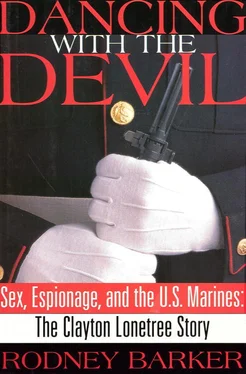The court-martial of Sgt. Clayton Lonetree officially began at 9:30 on the morning of August 11, 1987, and the prosecution went first.
Major Beck had given a great deal of thought to his opening statement. Most military prosecutors marched to the podium and dryly stated the list of offenses and the prosecution’s intention to prove them beyond a reasonable doubt, but that wasn’t good enough for Dave Beck. Not in a case that was being observed by the national media. Not when opposing him was an attorney notorious for bringing theatricality to the courtroom.
From the motions made by the defense in the pretrial stage, Beck figured the defense team was going to point the finger of blame at everyone other than their client, so at the very start he wanted to set the tone dramatically and emphatically for what he wanted the members of the court to keep in mind throughout the coming proceedings.
Pushing his chair back, he strode briskly over to the defense table, where he stopped, snapped to attention, raised his right hand, and staring Sergeant Lonetree fiercely in the eye, recited the Marine oath of enlistement.
“I, Clayton J. Lonetree, do solemnly swear that I will support and defend the Constitution of the United States, against all enemies foreign and domestic, that I will bear true faith and allegiance to the same, and that I will obey the orders of the President of the United States and the officers appointed above me, according to regulation and the Uniform Code of Military Justice, so help me God.”
Some of Beck’s legal friends had cautioned him against using this opening gambit. They were concerned the members of the jury would roll their eyes and think it was overly histrionic for a formal military hearing. But when Beck saw the entire defense team, including Sergeant Lonetree, leaning backward as if they’d just been blasted by a cold wind, he knew he’d made the right decision.
Swiveling on his heels to face the Marine officers in the jury box, Beck followed the script he had carefully prepared.
“The oath of enlistment is familiar to each of us, and I want you to keep it in mind throughout the course of this trial. Whatever sins of commission or omission by other organizations you may hear about, that is the oath this Marine swore to. And the evidence will show that he betrayed not only that oath, but his fellow Marines, and his country.”
Major Beck was of the mind that whether the charge was espionage or robbery, for a trial counsel to be effective he had to capture the jury’s interest right at the start. Then he had to keep them focused by reducing complex evidence to its simplest elements, and hold the jury’s attention all the way to the end with the strategic ordering of strong and weak witnesses. Experience had also taught him that juries were no different from ordinary people in that they liked to be told a story. So when he tried a case, he did his best to organize it into a compelling narrative, which he would unfold like a storyteller.
The bulk of Beck’s opening statement was devoted to previewing the evidence and highlighting the story the jury was about to hear—starting with Lonetree’s clandestine love affair with Violetta, which was the formal beginning of the recruitment process of him as an agent for the KGB; moving on to his expanding involvement with Uncle Sasha as they entered a conspiratorial relationship; and ending with the passing of documents and information vital to the national defense, “with reason to believe that it would be harmful to the United States, and helpful to the Soviet Union.”
Once he had hinted at the serious national-defense implications of Lonetree’s betrayal, Major Beck appeared to jump track. His voice lowered and his manner became more personal, as if he were taking the jury into his confidence.
“It’s only natural for you to ask at this point why a Marine, a Marine security guard with a top-secret security clearance, would commit such traitorous acts.”
If the question had not yet surfaced in the minds of the members, now it was their foremost thought, and Major Beck stroked their curiosity, saying that even though the government was not required to prove a motive, he intended to present evidence that would establish clearly that Sergeant Lonetree betrayed his country for all the usual reasons—sex, money, compromise, ideology—plus one. Embittered by the U.S. government’s treatment of American Indians, he sought revenge.
Wrapping it up, Major Beck predicted that by the end of testimony the members would agree with his conclusions. And “Justice and logic will demand a verdict that Sgt. Clayton J. Lonetree is guilty of conspiracy, that Sgt. Clayton J. Lonetree is guilty of espionage against the United States of America, that Sgt. Clayton J. Lonetree is guilty of all the other offenses on the charge sheets before you, in violation of the law, in violation of his oath, in violation of his duty.”
When the defense lost the motion to suppress Lonetree’s confession, the basic legal argument they had in the case was taken from them—or at least removed until the day it was reviewed by an appellate tribunal, where they felt it had a good chance of being reversed. But that didn’t mean they were giving up. Indeed, to his client Mike Stuhff had likened the situation to a baseball game. “First base is the motions. Second base the trial. Third the Court of Military Review. And home plate the Court of Military Appeals. What you have to remember is just because the other team got a single, that doesn’t mean the game is over.”
In anticipation of just this setback, the defense team—primarily William Kunstler, Mike Stuhff, and their investigator, Lake Headley—had spent innumerable evenings discussing alternative theories of the “crime.” It was a practice every defense team engaged in, and particularly appropriate in cases involving intelligence organizations, where, as a matter of course, one should always rethink the obvious. The range of conjectures they considered in their brainstorming sessions had strayed from the notion this whole thing was a Russian disinformation scam to distract State Department and CIA attention from someone in a much higher position who was providing the Soviets with compromising information, to the possibility that Lonetree was another Clifford Irving and this was all a hoax: He never had a relationship with Violetta, and he had concocted his confession because he realized he had no future in the Marine Corps and this would make him a celebrity and lead to a book and movie deal. The theory they settled on portrayed Clayton Lonetree as someone who had taken it upon himself to engage in freelance double-agentry.
“Things are seldom as they first appear. We all make snap judgments. But quite often there is something else beneath the surface that we don’t catch at the beginning,” Mike Stuhff told the members of the court in his opening statement for the defense. And after encouraging them to free their minds of any preconceptions they might have based on what they had heard or read about this case, and not to forget that so-called facts were always subject to interpretation, he introduced Sergeant Lonetree as somebody who never intended to betray his country but actually wanted to spy on the Soviets to help the United States.
The truth of this case, according to Mike Stuhff, was that Clayton Lonetree came from a family of war heroes who were held up to him as people to respect and emulate. He was somebody who felt he was in competition to be the star of the Lonetree family. And as a result he was always looking for a way to do something above and beyond the call of duty. In Moscow he found himself presented with an opportunity to give away little and score big. He thought he could match wits and outfox the KGB by giving them useless information and ensnaring a KGB general and his accomplices. All along he intended to expose the KGB’s efforts and its agents to the CIA, and in that way become a hero.
Читать дальше












